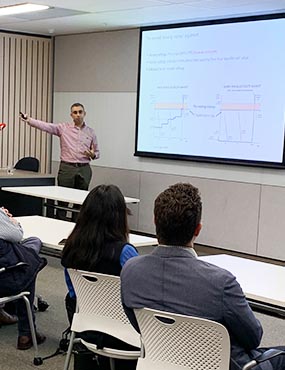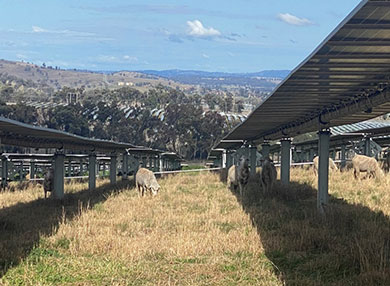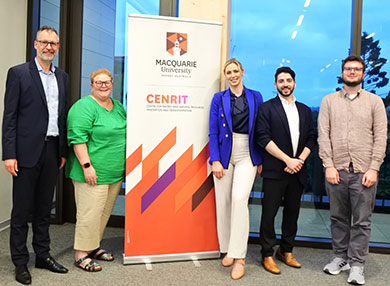Level 7, 4 Eastern Road
Macquarie University
Get involved
Explore our upcoming talks, seminars and conferences, and view information from some of our past events.
Upcoming events
News
Past events 2025
- Workshop on Sustainable Development and Resilience of Energy Markets (20-21 February)
Past events 2024
We were delighted to host world renowned expert Dr Farhad Billimoria, Visiting Research Fellow at the Oxford Institute for Energy Studies, for a public lecture on ‘The Hybridisation of Market Frameworks in Low-Carbon Electricity Systems’.
 Held at Macquarie University’s City Campus on the evening of Wednesday 21 August 2024, the packed room heard insights on objectives and optimal outcomes of electricity markets, the challenge of missing markets for long-term contracts to hedge away volatile risk exposures, and what the design of future electricity markets during different phases of the energy transition could look like. One solution, as suggested by Dr. Billimoria, might be to have a hybrid market framework that creates both incentives for efficient short-term (dispatch, operations) and long-term (contracting, investment) decisions by market participants.
Held at Macquarie University’s City Campus on the evening of Wednesday 21 August 2024, the packed room heard insights on objectives and optimal outcomes of electricity markets, the challenge of missing markets for long-term contracts to hedge away volatile risk exposures, and what the design of future electricity markets during different phases of the energy transition could look like. One solution, as suggested by Dr. Billimoria, might be to have a hybrid market framework that creates both incentives for efficient short-term (dispatch, operations) and long-term (contracting, investment) decisions by market participants.
The event, hosted by the Transforming Energy Markets Research Centre, was part of the centre’s Transforming Energy Markets event series and created a valuable opportunity for networking after the engaging lecture and audience questions.
Dr Billimoria is also a Director of Power & Renewables at S&P Global, and his research focuses upon market design for low-carbon power systems incorporating topics across short-term market mechanisms, derivatives and risk trading, auction theory, stochastic optimisation and power system security.
Recently he worked on the application of insurance theory as a means of securing reliability in markets with deep uncertainty. Dr Billimoria has over 20 years of industrial experience in the energy sector including eight years at the Australian Energy Market Operator (AEMO) where he led market reforms for low-carbon power systems.
Dr Billimoria holds a PhD from the University of Oxford, a Masters in Energy Systems, and undergraduate degrees in Laws and Electrical Engineering from the University of Melbourne.
Chilean visitors and TEM members embark on discussions

TEM recently hosted a delegation from the Faculty of Engineering and Sciences at Adolfo Ibanez University (UAI), Chile, and learned of many parallels between our countries as they embrace energy transformation.
We gained insights into innovative strategies and technological advances driving Chile’s commitment to sustainable energy, its natural resources and distribution constraints, market structures and regulation, and explored potential for collaborative research projects.
A guest lecture “Chile’s path to carbon neutrality in the context of SDG7 and the Institute of Clean Technologies (ITL)” was delivered by Mr Claudio Seebach, Dean Faculty of Engineering and Sciences and Chair for Latin America and the Caribbean in the World Energy Council, and Mr Francisco Pizarro, Innovation and Technology Director at UAI.
UAI delegates included:
- Ms Barbara Stengel, Vice-Dean Management and Engagement at the Faculty of Sciences and Engineering
- Mr Andres Jordan, Astrophysicist and Director of the Millennium Institute for Astrophysics and professor of the Faculty of Engineering and Sciences
- Mr Felipe Larrain, Associate Director for Research at the Center for Energy Transition.
TEM’s representatives included:
- Professor Stefan Trueck
- Prof Yijiao Jiang
- Dr Lurion De Mello
- Dr Lin Han.
Meetings between both university’s representatives explored options for applied research with industry, and discussion of opportunities for collaboration with the UAI Faculty of Engineering and Sciences, and its Innovation Unit, for research, technology transfer and development, through UAI’s research centres: Center for Energy Transition (CETRA), Clean Technology Institute, and Center for Uncertainty Quantification (CUQ), Bioengineering Innovation Center (BIC), plus showcasing its engineering research and teaching excellence.
Potential areas of shared areas of research interest range from technology maturity models and transfer to spin-off formations, regulatory frameworks to promote innovation, and encouragement of student training and entrepreneurship.
This includes acceleration and pre-incubation of student projects, linking educational programs with incubation and acceleration activities, and international research and development initiatives, and future exploration of dual degree agreements.
 Congratulations to TEM members Dr Madeline Taylor and Professor Vladimir Strezov for being awarded major grants by the Australian Research Council (ARC) and the Australian Renewable Energy Agency (ARENA).
Congratulations to TEM members Dr Madeline Taylor and Professor Vladimir Strezov for being awarded major grants by the Australian Research Council (ARC) and the Australian Renewable Energy Agency (ARENA).
Dr Madeline Taylor has been awarded more than $450,000 by the ARC for a prestigious Early Career Industry Fellowship. This highly competitive scheme provides funding for up to 50 outstanding early career researchers across Australia with the aim to foster two-way mobility and skill-building in research collaboration with industry, translation and commercialisation. The fellowship will allow Madeline to carry out the Foundational Australia Agrivoltaics Regulation Model (FAARM) project, with industry partner Spark Renewables and the Department of Primary Industries.
This three year project aims to design a just and efficient solar energy legal framework to assist Australia meet its ambitious renewable energy targets. It will overcome a lack of agreed legal principles, and conflicts over land use surrounding co-location of solar facilities with agriculture.
More certainty around regulation of solar facilities in agricultural settings is expected to boost uptake of this renewable energy option. To date, Australia has lagged other countries in co-locating solar facilities with agriculture because of regulatory uncertainty.
This project brings government, industry, and research together to accelerate the adoption of agrivoltaics and generate significant, socio-economic, and environmental benefits.
Expected outcomes include a comparative agrivoltaics database, industry-responsive regulatory model, and co-designed strategic guidelines boosting Australia's decarbonisation efforts and agricultural resilience.
Meanwhile Professor Vlad Strezov has received $1.5m in funding from ARENA as part of a $7.17m project that will run for five years to investigate the upcycling of steelmaking slag for material reuse.
The aim of the project is to develop a technology for separating high value components from steelmaking furnace slag that can be reused, with project partners The University of Queensland and Hamersley Iron.
The project is supported through ARENA’s Iron and Steel R&D Funding Round under the Transformative Research Accelerating Commercialisation Program to create solutions for Australian iron ore, predominantly lower grade ore from the Pilbara, and to decarbonise domestic steel production.
Annually, Australia produces one million tonnes of steelmaking furnace slag (SFS), which contains between 20-30 per cent of iron oxide, 40-60 per cent calcium oxide and up to 5 per cent phosphates. Techniques for extracting and recycling of these oxides into iron and steelmaking processes are not currently commercially viable due to difficulties in separating phosphates from the oxides.
The project proposes a novel SFS processing method which integrates a staged pyro-enrichment and hydro-leaching precipitation process for the separation of the higher value components present in SFS (calcium oxide, iron and phosphorous) for recycling and reuse.
Projects supported by the Iron and Steel R&D Funding Round seek to accelerate novel and innovative low emissions iron and steel technologies using Australian iron ore.
An international law perspective

At an evening seminar on 27 February 2024, Professor Alexander Proelss, a renowned expert from the University of Hamburg, explored the crucial role of international law in implementing marine carbon dioxide removal (mCDR) and carbon capture and storage (CCS) to mitigate climate change.
The sold-out event, organised by the Transforming Energy Markets Research Centre (TEM) and the Centre for Energy and Natural Resources Innovation and Transformation (CENRIT), took place in the Michael Kirby Building Function Room at Macquarie University.
Professor Proelss illuminated the challenges and necessities of global cooperation in harnessing negative emission technologies. He:
- holds the Chair in the International Law of the Sea and International Environmental Law, Public International Law and Public Law at the Faculty of Law at the University of Hamburg, Macquarie University’s strategic partner
- was visiting Macquarie University as part of a successful Deutscher Akademischer Austauschdienst (DAAD) Grant led by Dr Constantinos Yiallourides, Senior Lecturer in International Law at Macquarie Law School.
CCS technologies are crucial for achieving the Paris Agreement's ambitious climate goals. The seminar specifically addressed the jurisdictional complexities of the various maritime zones, ranging from coastal state sovereignty to governance in areas beyond national jurisdiction, under the United Nations Convention on the Law of the Sea (UNCLOS) and international climate change law.
The seminar underscored the importance of a unified legal and regulatory framework to facilitate the deployment of CCS technologies in offshore areas. As the world grapples with the urgent need to reduce greenhouse gas emissions and limit temperature growth, Professor Proelss’s insights into the legal pathways for authorising and implementing oceanic carbon storage projects were both timely and enlightening.
This event not only highlighted the crucial intersection between environmental law, energy law, and climate change mitigation strategies but also fostered a dialogue among professionals, academics, and students on the future of ocean decarbonisation technologies.
Guests travelled considerable distances to join the seminar, and participate in the Q&A session and the networking that followed. Discussions explored:
- ways for legal frameworks to support the global quest for sustainability and climate resilience
- showed the importance of TEM and CENRIT as centres for excellence in furthering knowledge and disseminating information through their programs of high-profile international guests as seminar presenters.
The seminar was introduced by Prof Lise Barry, Dean at Macquarie Law School. CENRIT and TEM leaders also contributed to the success of the seminar, including Dr Madeline Taylor, Dr Constantinos Yiallourides, Prof Tina Soliman Hunter who was the respondent to Professor Proelss, and Prof Stefan Trueck.